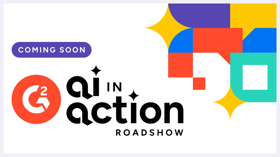April 29, 2025
 by Alexandra Vazquez / April 29, 2025
by Alexandra Vazquez / April 29, 2025

Rebranding isn’t just about a new logo or fresh color palette.
It’s a full-on identity shift that can make or break how your company shows up in the market. And while it might look polished on the outside, the behind-the-scenes work is anything but.
When done right, a rebrand can sharpen your story, strengthen your go-to-market (GTM) strategy, and breathe new life into how people see (and trust) your product.
Crystal Hoecker, Director of marketing at Docubee, knows this firsthand. After leading the charge on Docubee’s recent rebrand, she’s gathered valuable insights on what it really takes to navigate the process, get buy-in from leaders across the organization, and measure what matters post-launch.
To watch the full interview, check out the video below:
This interview is part of G2’s Industry Insights series. For more content like this, subscribe to G2 Tea, a weekly newsletter with SaaS-y news and entertainment.
What made you want to move forward with a total rebrand? And what did you actually change?
I've been with this company for six years now. Five of those years were when the product was called OnTask.io. The product was about a year old when I came in to do marketing, and it just felt like a consistent uphill battle. I even started trying to purchase the domains for OnTask.com because I felt so strongly about it. I spent about two years on that battle, and it didn't seem worth the investment.
So we started fine-tuning a large portion of our product to support contract and automated document processes. We started a huge messaging project to switch over to focus on contract and agreement features. We were already in the throes of that, which was a huge undertaking in itself. It was a whole website project, and we were changing everything about it.
One day, we were at a trade show and were having issues with our booths, and the only thing that we had available while that fiasco was happening was our tablecloth that said OnTask.io with our little logo of a checkbox. So I just turned it into research for my personal annoyances with the brand. Everybody came up and asked, “What do you do?” And I answered it with, “What do you think we do based on our name alone?” I ran that for about 45 minutes, and it was the most validating 45 minutes of my life. So I came back, worked with leadership, and said, “You know how we're doing this massive remessaging project? What do we think about rebranding the whole thing as well?”
I made the case, and everybody agreed with it. We started to take action really quickly. We found an agency and doubled down on that project because I wasn't changing my deadline; I just added a rebrand to it. The team was thrilled.
What were the biggest concerns or risks you had to navigate before committing to the rebrand?
First, we had to figure out what we wanted it to be and get everybody bought in before it started rolling out. We had to secure a name that was worth the effort. It's not very easy to secure something that makes sense and hasn't already been taken. We started building a mini brand to present the idea and get people on my side.

Join industry leaders at G2's free AI in Action Roadshow for actionable insights and proven strategies to reimagine your funnel. Register now
It didn't take long to get leadership on my side, which was great. But then, after I did, figuring out a way to roll it out to all the teams was a struggle. That was something I had to navigate in real time because I had never done this before. This was people's baby. People had been with this product since its birth, six or seven years ago. So it was like taking their child away when they first heard about it.
But we navigated through some emotions and got everybody on a cohesive project management sheet. I just turned into a project manager and got all the teams on board and aligned with heavy communication and heavy accountability. That was the only way to make it work, plus a lot of positive energy along the way. The name Docubee was fun because we got to use bee puns throughout the process, and it just added a little comical relief to every stressful situation.
How did you ensure alignment between marketing, sales, product, and leadership during the rebrand?
We went to several agencies and some team members and asked them what they thought the effort would be, and I tried to get a budget and expected timeline. It wasn't hard to make the case for why OnTask.io wasn't helping us. The sales team was falling all over themselves. Everybody thought we were a task list. Overcoming that at the beginning of every conversation was so hard. Everybody knew we had to change to something.
So once we explained what we were doing, why we wanted to do it, and the amount of work it would take from everyone, it wasn't hard to get everybody to buy in, because I was very graceful. I asked everybody what they could do. I didn't give them a hard deadline and say, “You have to do this.”
I came to them with the why, the passion, the excitement, and I asked what worked within their roadmap and what was realistic for them. It made them feel seen, heard, and appreciated. And then, we all put the plan together in tandem. I think going to everybody and saying, “This is a directive, we're doing this whether you like it or not,” would have been bad. Making everybody feel a part of the process was really important.
Did you also involve customers, partners, or external stakeholders in the process? If so, how?
We asked a few of them along the way. We started doing casual interviews with customers regarding their satisfaction with us. We have some partners that we battle with every day, so there's a high level of trust. As soon as we mentioned that we were considering this, they were like, “Thank goodness, this is going to help everyone.”
It seemed so obvious once we made the decision. I did some of the consumer research myself. When people asked what I did for a living, I would say, “I do marketing for OnTask.io. What do you think we do?” It just became my little test for a month, and I started writing down all the answers. Then I started hearing back from our sales development representative (SDR) team about where they struggled. I was listening to call recordings, and I could just tell that the prospects were stumbling over that answer. It shouldn't be that big of a struggle. For a B2B SaaS product, it shouldn't be that hard. I knew it was a mountain that we could climb easily if we just came up with the right name and brand to overcome it with.
Was there a specific brand story or message you wanted to reinforce with the new identity?
As we were bringing the contract story to life, I needed a better way to do it. The brand story that lived behind OnTask.io was very forced. It didn't click, and we couldn't make it resonate, even with our customers. They used us because we’re a great technology, not anything to do with our brand. But I knew that brand advocacy and loyalty mean so much.
So, as we were trying to tell this contract story with OnTask, I struggled to make that story make sense. When we switched over to Docubee, a lot of things clicked. The bee flies through the process the same way that people would expect to go through these processes. The worker bees are the people and the admins. It all just started clicking.
When we weren't hitting our sales goals, I could tell the enthusiasm and energy were out. And as the head of marketing, I own that. I don't know why I decided to own the energy of our entire product, but I do. We needed something to bring life back to us.
As soon as we got through some of the emotions of losing OnTask.io, everybody was 100% in. We even had a wake for OnTask.io to part with the brand and appreciate everything it did to get us where we were. It was really funny and great. A lot of it was during COVID, too.
So, the rebrand worked on a lot of fronts. It's helped sales, it helped us tell our story better, it helped people identify with us more quickly, and it made us more memorable, which is what we needed. OnTask.io wasn't memorable for anything we wanted to be remembered for, but it served a really strong purpose to get us where we needed to be. And it laid a fantastic foundation product-wise. We just needed a brand to help bring that product to life.
After a year, how would you define success for the rebrand? What key metrics mattered most?
After we hit a full year after the rebrand in December 2024, we ran brand research with a third party to get an understanding and set a new benchmark for what people understand Docubee to be, based on specific target industries. The feedback from that was great. One year in and we already have brand awareness. Six years with the old brand and we never had that. So to be able to accomplish that in one year was great.
The stuff that I'm really able to see and tie back to the rebrand is our direct website traffic going up. Now that we have this new brand, we've done a lot of brand awareness campaigns where they're going directly to Docubee.com. Everything else we do, as any marketer knows, is going to a landing page or a very specific place. Brand awareness happens with just your homepage and your primary domain. We've watched that go up about 250% since we started actively doing heavy brand awareness campaigns in late fall.
We've had about a 240% increase in leads, which we can attribute to our brand awareness activities. And we've already seen like 10 to 20 deals start to close. Our sales life is so much easier. We’re watching the pipeline we're able to build, and the more qualified leads we're able to get from inbound and outbound. All of these factors have left me feeling so great about the decision to rebrand. Even though it may have taken a few years off my life, it was the right decision.
Were there any unexpected results?
Watching the year-over-year traction, I expected it to be a recovery year coming off of OnTask.io. We set goals that were still growth goals as they related to everything from inbound to outbound, and paid. I expected a lot of excuses as to why we were falling.
All it did was go up. It had a few ebbs and flows, but it still went up, and it's continuing to do so. I would love to see revenue directly tied back to brand awareness. That's not a reality all the time, but I am starting to watch everything tick up. The main thing I can attribute it to is the many new activities marketing has led that have helped bring this product to life.
We're now doing videos, we're streaming, and we're doing a lot of physical presence, even outbound is just easier. Being able to do all of that and watch the impact that it's having is something you can't discount. You can't say that this rebrand hasn't made an impact. Looking at all of our numbers on the back end, you really can't.
It's been so fun to bring this brand to life. We couldn't bring the OnTask.io checkmark logo to life. I tried. We talked about having a dog named Checkers, and it didn't work. But we got this one to life, and our Docubee bee mascot is Ziggy, and he is a fan favorite. It's been really, really fun, and it'll continue to be fun.
Do you think branding should constantly evolve, or is it better to establish a long-term identity that stays consistent?
I think it's a blend. Once you've established who you are and the values people associate with your brand, you have to keep the core components for brand consistency. But brands should evolve. Times change. Target markets may change. We find product-market fit in different areas all the time. So we need to cater to what they expect and need and speak their language, which also comes from a brand perspective.
I don't mark anything as done. Everything in marketing is a process. Everything can be optimized. We're a much more data-driven company than we were years ago because now we have data to track. Taking that data and making decisions as it relates to our brand, messaging, and the types of content people want to absorb is important. You have to do it to stay relevant with your audience, customers, and prospects.
So, our work in branding is never done, but it's a much more fun uphill battle that we're taking on now. It's worth it, but it's never done.
Subscribe to G2 Tea, our SaaS-y newsletter with tech insights and tidbits from industry professionals like Crystal!
Follow Crystal Hoecker on LinkedIn to learn more about her 10+ years of SaaS marketing expertise and how she’s continuing to transform the Docubee brand.
Edited by Supanna Das
Alexandra Vazquez is a former Senior Content Marketing Specialist at G2. She received her Business Administration degree from Florida International University and is a published playwright. Alexandra's expertise lies in copywriting for the G2 Tea newsletter, interviewing experts in the Industry Insights blog and video series, and leading our internal thought leadership blog series, G2 Voices. In her spare time, she enjoys collecting board games, playing karaoke, and watching trashy reality TV.
In the rush to embrace AI, many companies are sprinting toward adoption without a clear...
 by Alexandra Vazquez
by Alexandra Vazquez
Imagine your latest LinkedIn post just hit 50,000 likes. The notifications are buzzing, and...
 by Tanushree Verma
by Tanushree Verma
CFOs continue to raise eyebrows when CMOs assign budgets to influencer marketing. But why? ...
 by Kamaljeet Kalsi
by Kamaljeet Kalsi
In the rush to embrace AI, many companies are sprinting toward adoption without a clear...
 by Alexandra Vazquez
by Alexandra Vazquez
CFOs continue to raise eyebrows when CMOs assign budgets to influencer marketing. But why? ...
 by Kamaljeet Kalsi
by Kamaljeet Kalsi


